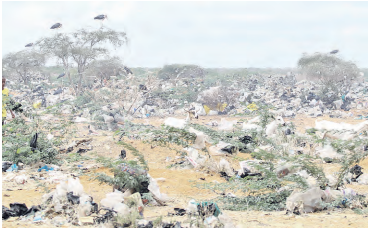
Kenyan civil society groups have urged African leaders to unite in demanding for decisive action to reduce production of plastics and eliminate hazardous chemicals in plastics throughout their lifecycle.
The groups urged for a legally binding instrument to protect vulnerable women, who make up nearly half of all waste pickers in Kenya.
Nairobi-based Centre for Environment Justice and Development and Heinrich Böll Foundation Nairobi, complained that plastic production has more than doubled in the last 15 years, with global output reaching 400 million tonnes annually.
Cejad executive director Griffins Ochieng emphasised the importance of solidarity among African nations.
“African countries as net importers bear the brunt of plastic pollution,” Ochieng said.
“Previous negotiations have seen petrochemical companies dominate the discussions, sidelining the voices of High Ambition Countries. It’s time for African leaders to stand united and demand a treaty that prioritises eliminating hazardous chemicals, ensures transparency and includes mechanisms for labelling, tracking, monitoring and data-sharing.”
He spoke in Nairobi ahead of the Fifth Intergovernmental Negotiating Committee on the Global Plastics Treaty in Busan, Korea.
Less than 10 per cent of all plastics globally are recycled, leaving waste to accumulate in ecosystems, harming biodiversity and burdening marine and terrestrial environments.
“We are facing a global plastics crisis with global production significantly outpacing our ability and capacity to soundly and sustainably manage our waste” added Griffins.
“An approach based on national rules would make the treaty largely ineffective. Global legally binding measures would instead create a level playing field for all countries and economic actors and ensure that meaningful global mechanisms exist to reduce plastic production.”
Waste pickers are disproportionately affected, despite their significant contribution to plastic collection, sorting and recycling of plastics in many countries, especially those in the informal sector.
Women waste pickers in particular are especially vulnerable.
In Kenya alone, women represent a substantial number of between 40 per cent and 50 per cent of waste pickers in urban areas like Nairobi, Kisumu and Mombasa, Cejad said.
Laws and policies that safeguard their wellbeing and economic status are often ignored.
Joyce Wangari, a waste picker from Nairobi recyclable waste association, urged leaders to champion policies that protect informal workers.
“African leaders must ensure that a just transition for waste pickers is captured in the treaty. This includes access to safe, dignified and regulated employment, skill development, fair wages and social protections,” she said.
Available and adequacy of the existing funding mechanisms of the implementation of the plastic treaty was also discussed in the meeting.
A robust international treaty will require a predictable, and sustainable financing mechanism that includes a dedicated multilateral fund.
The funding model should also ensure financing of the implementation of the treaty is shouldered by the polluting countries.
“Currently the Global Environment
Facility and the Green Climate Fund
are not an adequate pool of financing for the implementation of the
Plastic Treaty,” Dorothy Otieno,
programme officer at CEJAD said.











